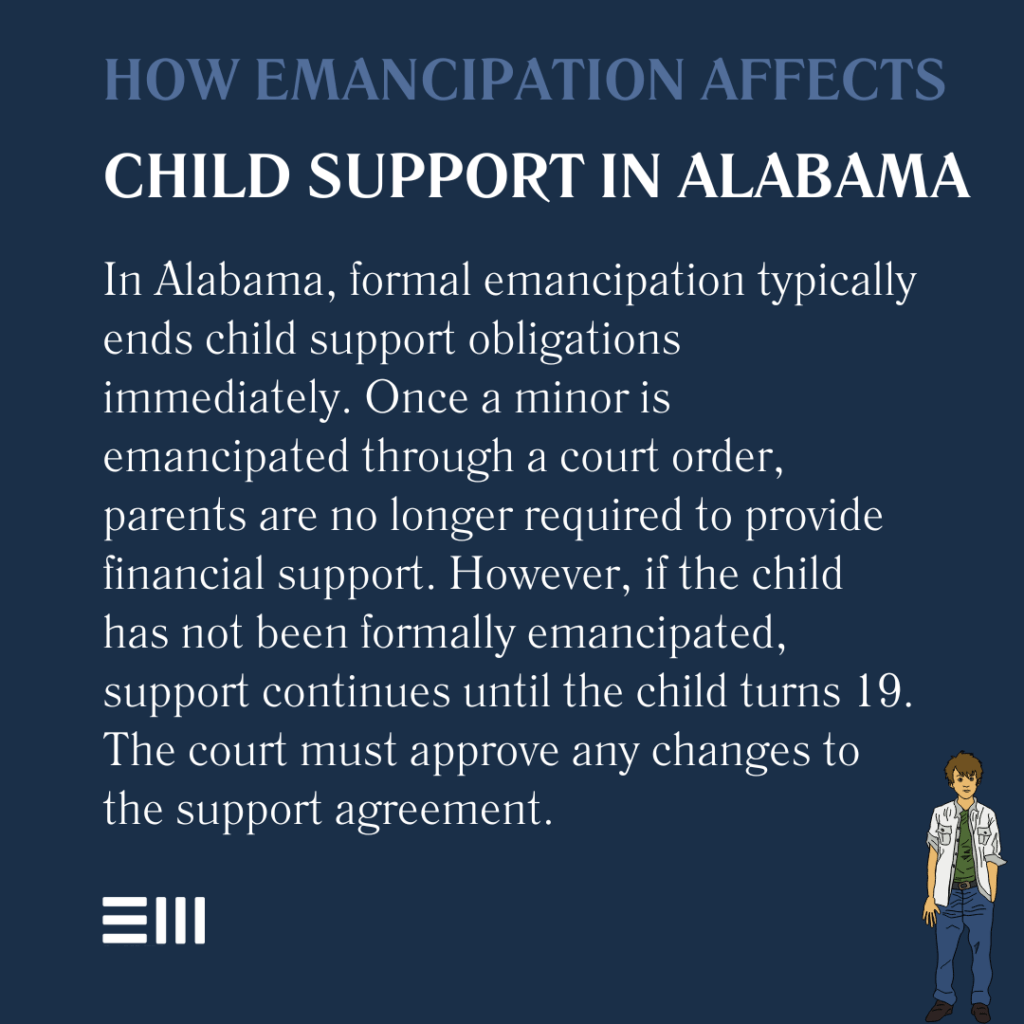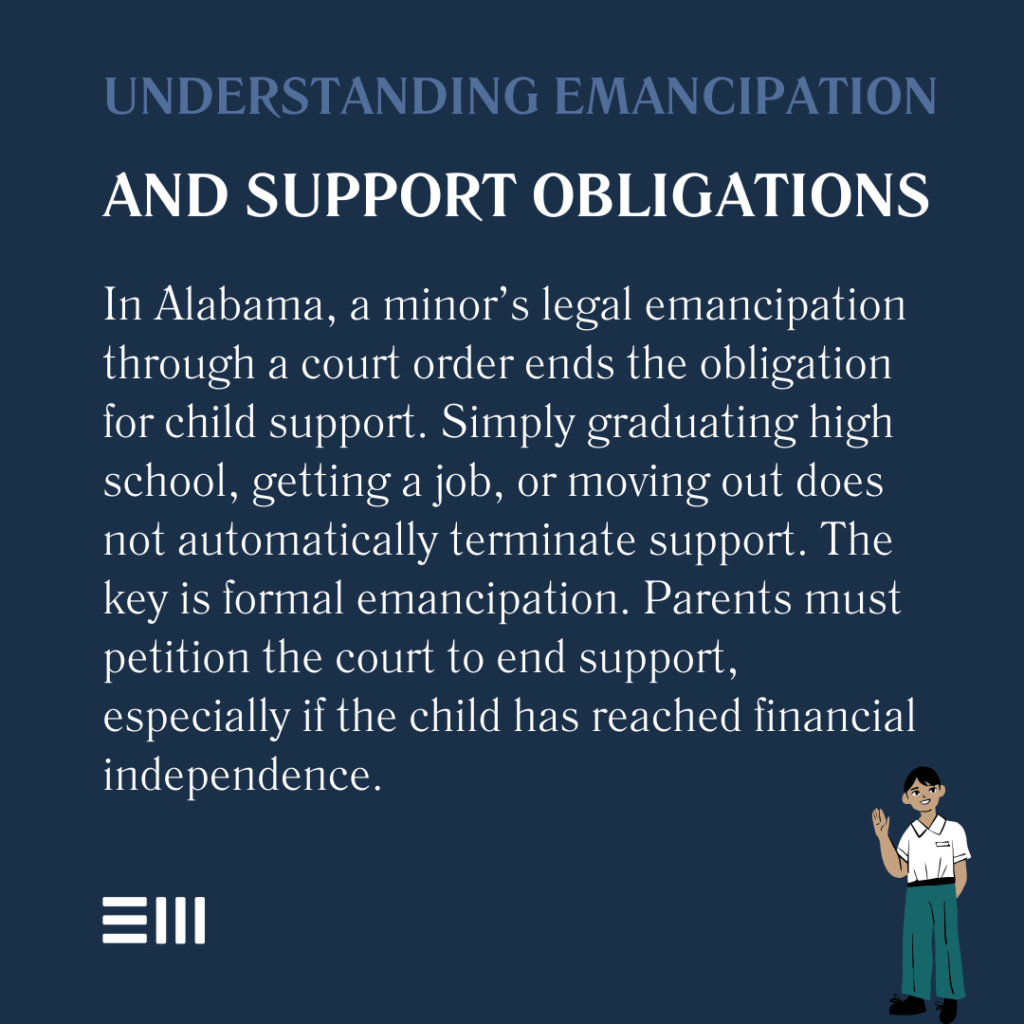
“I cannot say that the trial court’s judgment was plainly and palpably wrong under the law as it stands now; therefore, I have no choice but to concur, albeit reluctantly,” wrote Alabama Court of Civil Appeals Judge Monroe in Anderson v. Loper.
His special concurrence revealed his belief that requiring parents to support an 18-year-old who moves in with her boyfriend against their wishes “does no favors to either the ‘child’ or the parents.”
This landmark case crystallizes Alabama’s approach to child support and emancipation. For parents paying support, the question is straightforward: Does a child’s legal independence end their financial obligation?
The answer lies at the intersection of Alabama family law, parental responsibility, and a young person’s quest for autonomy.
Understanding Legal Emancipation in Alabama
Emancipation in Alabama is the legal process that grants minors most adult rights before reaching the standard age of 19. This status change fundamentally alters the parent-child relationship.
Alabama Code Section 26-13-1 allows minors to petition for emancipation after turning 18 but before 19. Courts determine whether emancipation serves the minor’s best interests after examining their maturity, financial independence, and living situation.
This formal legal separation differs significantly from simply moving out or becoming estranged. Emancipation represents a court-ordered status change giving minors specific adult rights, including the ability to enter contracts, make healthcare decisions, and manage finances.
Alabama courts distinguish between this formal legal emancipation and “constructive emancipation,” where a minor takes adult-like actions without court approval—a distinction critical for child support questions.
How Emancipation Affects Child Support Obligations
Emancipation typically terminates child support obligations that would otherwise continue until age 19 in Alabama.
The legal effects include:
- Formal emancipation decrees generally end child support obligations immediately;
- Parents no longer must provide basic necessities to emancipated minors;
- Future support payments are canceled;
- Existing arrears typically remain enforceable; and
- Support orders usually require formal modification.
The Anderson v. Loper case established that “once a child is emancipated, a parent no longer has a duty of support.” However, independence without formal emancipation doesn’t automatically terminate support.
The court specifically found that graduating high school, getting a job, and moving out were insufficient to establish emancipation without a court decree.

The Anderson v. Loper Precedent
This 1996 Alabama Court of Civil Appeals decision remains the controlling precedent for emancipation and child support cases today.
Gary Lee Anderson petitioned to terminate his support obligation after his daughter Denina:
- Graduated high school;
- Got a job;
- Moved in with her boyfriend against her parents’ wishes; and
- Started college on a Pell Grant.
The court denied his petition, establishing that:
- These independent actions don’t automatically constitute legal emancipation;
- Support continues until age 19 unless formal emancipation occurs;
- Courts must evaluate whether the child is truly self-supporting and free from parental control; and
- Continued financial help (like car payments) indicates ongoing dependence.
Judge Monroe’s special concurrence revealed judicial tension around this issue, but the court upheld the continuing support obligation, drawing a clear line between independence in fact and independence in law.
When Formal Emancipation Has Not Occurred
Without court-ordered emancipation, Alabama parents generally remain obligated to provide support even when children show significant independence.
Without formal emancipation:
- Support continues until 19 regardless of living arrangements;
- Obligations remain enforceable even if the child moves out against parental wishes;
- The child’s employment doesn’t affect the support requirement;
- Parents cannot unilaterally stop payments based on the child’s behavior; and
- Only court modification can legally adjust or terminate support.
The Anderson court specifically addressed situations where children move out against parental wishes, finding that such actions don’t automatically end support obligations.
This approach protects children from premature termination of support while requiring parents to use proper legal channels for modification.
Special Circumstances That May Affect Support Obligations
Certain situations can create exceptions to standard rules regarding emancipation and child support in Alabama.
These special circumstances include:
- Marriage (which creates automatic emancipation);
- Military enlistment;
- Independent wealth or inheritance;
- Disability extending into adulthood;
- Court-ordered educational support; and
- Agreements establishing support beyond standard termination dates.
Alabama courts recognize marriage as creating a form of legal emancipation that typically ends support obligations. For other circumstances, courts take a fact-specific approach rather than applying rigid rules, balancing parental responsibility against the minor’s developing independence.

Steps to Legally Terminate Child Support After Emancipation
Parents seeking to end child support obligations after emancipation must follow specific legal procedures to avoid future complications.
The proper process includes:
- Filing a petition in the court that issued the original order;
- Providing documentation of the emancipation decree;
- Serving notice to all parties;
- Attending scheduled hearings;
- Obtaining a formal termination order; and
- Ensuring proper recording with enforcement agencies.
This process protects both parents and children by clearly documenting when and why support ended. Verbal agreements or informal arrangements lack enforceability if disputes arise later. The formal process provides legal certainty against future claims.
Impact on Arrears and Past-Due Support
While emancipation typically ends future support obligations, it doesn’t erase arrears that accrued before emancipation.
Key principles regarding arrears include:
- Past-due support remains enforceable despite emancipation;
- Interest continues accruing according to Alabama law;
- Standard enforcement mechanisms remain available for collection;
- Courts rarely waive arrears based solely on subsequent emancipation; and
- Payment plans may be negotiated but typically can’t eliminate established debt.
Alabama courts consistently distinguish between future obligations (which emancipation terminates) and existing arrears (which remain enforceable). This approach reflects that support is the child’s right at the time it accrues, and subsequent status changes don’t retroactively eliminate these rights.
Frequently Asked Questions About Emancipation and Child Support in Alabama
Parents navigating emancipation and child support issues often have specific questions about their rights and obligations.
Does a Child Moving Out Automatically End Child Support in Alabama?
No. As established in Anderson v. Loper, parents remain legally obligated to provide support until the child reaches 19 or becomes formally emancipated through court proceedings. A child’s independent living doesn’t constitute legal emancipation by itself.
Can Parents Stop Paying Support if Their Child Is Self-Supporting?
Financial independence alone doesn’t justify terminating support without court approval. While self-support may support an emancipation petition, parents can’t unilaterally stop payments based solely on the child’s employment or financial situation.
Does a Child’s Refusal to Communicate with a Parent Affect Support Obligations?
Generally, no. Support obligations typically continue regardless of relationship quality. The Anderson court didn’t accept lack of communication as grounds for terminating support. While courts may consider visitation interference in some cases, strained relationships usually don’t justify ending support without formal emancipation.
How Does Marriage Affect a Minor’s Child Support Eligibility?
Marriage generally emancipates a minor for support purposes, typically ending child support obligations. Parents should still formally modify existing orders rather than simply stopping payments when a minor marries.
Can College Attendance Extend Child Support Beyond Emancipation?
Standard support orders terminate upon emancipation or age 19 regardless of college attendance. However, separate college support orders or agreements may create continuing obligations that survive emancipation.
Secure Your Financial Future with Expert Legal Guidance
Navigating the complex interplay between emancipation and child support requires expertise in Alabama family law. Whether you’re seeking to terminate support after emancipation or defending against premature termination, professional guidance ensures your rights are properly addressed.
Our experienced attorneys have represented clients on both sides of emancipation and support disputes throughout Alabama.
We understand the nuances of Anderson v. Loper and other precedents that determine when support obligations truly end. Our team provides clear guidance on establishing or contesting support termination based on emancipation.
Contact Baxley Maniscalco today for a confidential consultation about your emancipation and child support questions.
Can't find what you're looking for? Search our site below.










